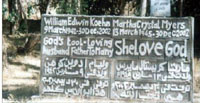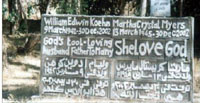
New departments for obstetrics and kidney treatmentJibla Hospital still flying strong [Archives:2004/710/Health]
February 9 2004
 |
 |
Yemen Times Staff
Fourteen months ago, Jibla Hospital, in the governorate of Ibb, which was run by the American Southern Baptist Convention, came under a tragically dramatic incident when some American aid workers were killed by an extremist.
Hospital administrator Bill Koehn, 60, of Arlington, Tex., who had planned to retire after 28 years of service; hospital purchasing agent Kathleen A. Gariety, 53, of Wauwatosa, Wis.; and Dr. Martha C. Myers, 57, of Montgomery, Ala. were killed when a Yemeni gunman burst into the hospital and opened fire.
The Yemeni extremist, Islamist Abid Abdulrazzak, has been found guilty of the killings, and faces execution. That sentence, however, is still under appeal.
Despite the incident the hospital has continued to offer its services to the citizens of the Jibla area and any other Yemeni citizens.
The Yemen Times Taiz bureau recalls the tragedy with interviews with representative of the American Baptist organisation and the hospital, which is now administered by Yemeni, with support from the Baptists.
Lee Hixon, representative of the American Baptist Organisation still working at the Jibla hospital, said that he was very pleased that the Yemeni government had undertaken the administration of the hospital, praising the great efforts exerted by Dr Abdulkareem Hassan for the hospital. He said the Baptist and the Yemeni organization each complement the work of the other.
Remembering the incident, Hixon says he has lost his friends, confirming that they are happy even after their demise because the hospital is still open and offering services.
Hixon remarked that the Yemeni doctors and the hospital's administration is working hard to maintain the reputation of the hospital, affirming that Jibla hospital is considered one of the best in Yemen.
Regarding the killer, he said, “We have to forgive others. We have forgiven the person who had killed my friends last December, and I think if we forgive others our life will be easier.”
Mr. Hixon said he had forgiven the killer and he prays that God would help him. Personally, he said, he hoped the killer's life would be spared.
The Baptist support involves training of Yemeni doctors and nurses, offering medicines, providing foodstuffs for orphans and the poor in addition to offering health care to some poor families in Jibla and financial support for them, all in coordination with the hospital administration.
Hixon said that charitable work was the responsibility of each person who had to help the poor people.
“I like working with the Yemenis and the Islamic charitable societies and the government. I think we must all of us work for charitable action,'' he said.
Meanwhile, following is an interview with hospital security officer Mr. Ahmed Saif.
Q: How do you assess the security situation after a year of the incident?
A: You have already seen the security situation is very normal around and inside the hospital. We have erected two check-points, one depends on the human element and the other using electronic equipment, and we prevent any person from entering the hospital without inspection. Guard measures are very strict.
Q: How do you respond to the American State Department warnings to its American nationals?
A: If the degree of alert in the world is raised, we would automatically do the same because our position is connected with world events; they are afraid about their lives and we are afraid about reputation of our country and its security and stability.
Q: Is there any difference in the security situation now?
A: The difference is very big. Our security preparedness is more developed and we treat the citizens and the American with transparency and modern ways. The citizens are very cooperative with us regarding the search of women.
Q: Are they satisfied with the security measures especially during special occasions, if they want to be outside the hospital?
A: In fact they are very much satisfied because we deal with them in a high transparency and there is coordination with them for arranging security measures. This has helped us in the process of stability and I think what happened would not be repeated.
Interviewing the hospital manager, Dr. Abdulkareem Hassan, the Yemen Times asked him:
Q: How do you explain their insistence on stay despite of the incident?
A: I think it is their love for Yemen. I do not know if there are other reasons. The thing I know that they want to offer humanitarian assistance to Yemen as they feel the hospital has offered much and they want it to continue. In fact they have offered much and saved the life of many people.
Q: From here does financial support come?
A: After handing over the hospital, the Ministry of Health has appropriated a budget for it. We have signed contracts with the former 19 employees with the same salary they were paid by the organisation. The hospital is now depending on its income which amounts to more than YR 50 million. We have purchased some medical equipment and are offering help to the poor in the same previous way.
The Baptist organisation continues in its support in both the medical side and some medical requirements as free of charge grants estimated at more than $25,000 per year. They have a strategy of handing over the hospitals they run in all third world countries to their governments, including Yemen. They acknowledged that the hospital of Jibla is the only one that was able to continue and develop in addition to a hospital in Korea. This is a testimony we hold as dear to us and we are proud of it. Recently the hospital has witnessed a big development compared to what it was in the past.
Q: Do they have a special office for offering assistance and do they help the poor outside the hospital?
A: Yes, they do have such an office and they offer assistance to the sick and the poor and we do not interfere in their work. For example there are some poor people registered with them and they treat them at the hospital where we offer them help.
Q: Do they follow up the trial of the killer Abid Abdulrazzak who, as you know, was sentenced to death?
A: They have assigned a person from the American embassy in Sana'a and certainly they follow up the news, but I don't know the criteria they depend.
Q: Are they satisfied with the American policy in the region?
A: Frankly I do not talk to them in politics at all.
Q: But don't they think that the cause of the incident is the American policy?
A: Not the American policy but they are aware that there is a problem in the Middle East. Perhaps once or twice they mentioned to some people who come to discuss a security question that they are not satisfied with their government policy but mostly they are concerned with their job and that they have come for assistance and nothing else.
Q: Do you now offer the same assistance to the poor as before?
A: Yes, the assistance is still going on and we have special registers on it. As for medicines coming to us as grants from the American organisation they encourage us to offer more help. For instance heart medicine is not available at Jibla hospital and its price reaches about YR 10,000 but we dispense it for four thousand rials. Other medicines we distribute them at the price of the system of popular support for the hospital and with the help of this system we managed to cover the cost of lighting project of the hospital.
Q: How many citizens visit the hospital?
A: We began with receiving citizens at a rate of 1,400 people in a month and now the figure jumped to 3,113 per month. There are 20-30 surgical operations done every day while at the time of the American administration of the hospital the figure did not exceed 7 operations in a day. We have also opened new departments such as an obstetric department and another for kidney diseases.
Q: Any more comments?
A: I'd like to thank the Yemen Times for its interest in Jibla. We bear respect and appreciation for the newspaper. I'd also like to say that the hospital is still working in its previous way and we are continuing in developing it.
——
[archive-e:710-v:13-y:2004-d:2004-02-09-p:health]


